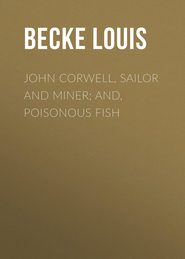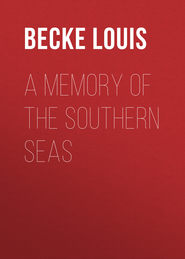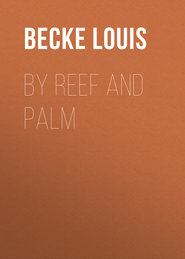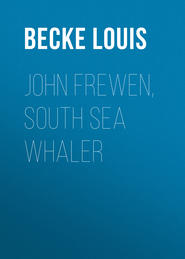По всем вопросам обращайтесь на: info@litportal.ru
(©) 2003-2024.
✖
Tom Gerrard
Настройки чтения
Размер шрифта
Высота строк
Поля
“Well—keep this dark from Lizzie, old man—I gave ‘em a cheque for two hundred and fifty pounds.”
Gerrard’s clear laugh. “Poor Lizzie! She thinks you gave them fifty pounds only.”
“Just so, just so—you see, old man, Lizzie isn’t a bit mean—and she doesn’t know that I am as well in as I am, so I told her a fifth of the truth. I said that fifty pounds was a great help to a hard-working man with a large family.”
“Cunning beggar!”
“Then, as Coll struck me as being a downright, straightforward man, who had a pretty stiff pull of it to bring up and educate his children decently on seven pounds a month—seaman’s wages.—I got him a berth as wharfinger to a steamship company at twelve pounds, and he was made as happy as a sandboy, I can tell you: Lizzie knows that much, for I told her. And she lets the youngster write to the Colls now and then.”
“Does she?” said Gerrard, dryly. He could not help it. Then he sat up, and re-filled his pipe.
“Ted, old chap, I like that youngster. Let me have him and take him to Ocho Rios with me. I want little Mary most, but know you won’t part with her, and even if you would, a cattle station in the Far North is no place for a girl. But let me have the boy. I’ll be good to him.”
Westonley made no answer at first. Then he said slowly, “I’ll tell you in the morning, Tom. Good-night.”
CHAPTER V
Soon after sunrise, as the two friends were drinking their morning tea ere they started back for Marumbah, Westonley told Gerrard that he had decided to let him take Jim away with him to Ocho Rios.
“He is provided for in my will, Tom, but you must never let him know it. I think it is a mistake to let youngsters know that they will have money left to them some day.”
“Quite so, Ted. And I am sure that you will never regret letting me have him, and I will bring him up as if he were my own son. There is no school within two hundred miles of Ocho Rios, but I think I am quite capable of giving him a decent education.”
“Little Mary won’t like it, Tom. She is passionately fond of him, and will cut up very rough over the parting, I fear.”
“Poor child! But, of course, she will see him again in a few years. I can see, that next to you, Jim is her ‘dearest and best.’ If I were a married man, Ted, I would ask you for her as well. Every time she looks at me with those big, soft eyes of hers, I see poor Mary again, and when she speaks, hear the soft sweet voice again.”
“She is a lovable child, and, look here, Tom, old man, I’ll tell you something that has made me grizzle in secret for many years—Lizzie doesn’t care for her. I don’t mind her being a bit sharp with the boy how and then, for he’s a terrible young Turk at times, and I’m too easy with him; but little Mary is such a gentle, soft sort of kid, that I wonder how anyone could possibly help loving her. But, somehow or other, Lizzie doesn’t. Still, within the last few days—ever since you came in fact—she has been a bit warmer in her manner.”
Gerrard nodded. “Lizzie will come round to like her in time, Ted, And, I say, old fellow, since you have been so open with me, I’m going to say something to you that you perhaps may not like, and think I’m an interfering ass. But, ‘honest Injun,’ Ted, I mean well—like a good many other idiots do when they meddle with other people’s domestic affairs.”
“Go on, sonny,” said the big man, quietly, “you never talk rot.”
“Well, it’s this. Lizzie is simply fretting her life out at Marumbah, and I think that, in a way, you are to blame. She does not like living in the bush, and does not seem to care for the people hereabout. I had quite a long yarn with her the first day I came to Marumbah, and although at first she tried to be the stiff, austere lady with me, I wouldn’t have it. Made her sit on my knee, and all that, you know, stroked her hair, and pinched her pretty little nose.”
“Tom, if I didn’t know you better, I would call you a liar.”
“Fact! You know as well as I do that she has always looked upon me as a black sheep. But she is going to change her mind about me, and I’ll bet you a fiver that before I leave Marumbah, I’m going to be ‘Tommy’ to her, as I was in the old, old days.”
Westonley’s sun-tanned face flushed with pleasure. “Tom, I’d give half of all I’m worth to see her and you friends again. I know how bitterly she affronted you years ago.”
“Oh! that is all forgotten, old son. I was to blame for going off in such a silly huff. I behaved like a bear. We men don’t understand women, Ted, and make hideous fools of ourselves. And that brings me to what I wanted to tell you—which is, that you are a blazing idiot.”
“Tom, whatever you say, and whatever cheek you give me, I will take it quietly, although I could knock you out in four rounds,” and Westonley thumped Gerrard affectionately on his back with his great hand. “Now, I know I’m a thundering ass but I’ll be as meek as a lamb to you, you black-faced, under-sized little beggar.”
Gerrard laughed. There was a difference of four inches in their respective heights; Westonley being six feet two inches. He knew by the inflection of the big man’s voice that he had become a much happier man within the last ten minutes, and the knowledge of it gave him a great satisfaction.
“I may not be as big as you,” he said, “but if I was the same shape, I’d go to a bush carpenter, and get him to trim me down with an adze.” Then after this jest, he resumed seriously. “Well, Ted, it is just this. Lizzie says that she likes Sydney but you do not, and that you will never stay there for more than a week at a time. Now, that isn’t doing the square thing by her. You and I as well, never think that the many years she spent in England gave her a taste for many of the refinements of civilisation—pictures, high-class music, especially Churchy music, and all kind of things like that, which are always dear to a highly-educated and naturally clever woman, Now, when she married you, and settled down to a station life, she gave up a good deal, and as the years go on, she feels it more and more, and no woman in the world can always be an angel, you know, although we tell ‘em so when we ask ‘em to marry us. Do you follow me?”
“I’m listening for all I’m worth, my son. If we were in a room, you could distinctly hear the wall paper adhering to the wall.”
“Well, now, as I was saying, that isn’t fair to Lizzie. What is the use of her going to Sydney for a week? Just as she is beginning to enjoy herself, and feel something of the life she had in England, you drag her back to Marumbah to your beastly bullock punching.”
“But I don’t want her to come, Tom. I’ve always urged her to stay there for three months—or six, if she liked.”
“Bosh! What pleasure would she have in being there alone; for although a woman may have lots of women friends, she’s practically alone if her husband isn’t with her. Tumble?”
Westonley nodded. “Go on, Tommy, go on to a dead finish. I am beginning to see I’m in fault.”
“Of course you are. And if you don’t give her a long change in Sydney, and stay there with her, you’ll feel sorry for it; she’ll become a religious monomaniac, and go in for High Church, auricular confession, and an empty stomach on Fridays. She’s got a turn that way, remember. A conventual education in a High Church school in England isn’t a very healthy preparation for a girl who afterwards marries a hulking, horse-racing, hard-riding Australian squatter.”
“What am I to do?” asked Westonley.
“Take her to Sydney next week. We’ll all go together, little Mary included, and I’ll stay with you for a couple of months. I’ll stand half the racket.”
“Shut up! Do you think I can’t run Lizzie, little Mary, and myself without you chipping in?”
“All right!” and Gerrard, secretly delighted, but showing no sign of it, went on placidly: “you see, Ted, you have a good man in Black” (head stockman at Marumbah). “What he doesn’t know about cattle isn’t worth knowing, and there’s no need for you to come tearing back for mustering, and branding, and attending to things generally. D’ye think that if you died to-morrow the cattle would go into mourning, and would refuse ‘to increase and multiply’? No one in this world is indispensable, although everyone thinks he is, and that, when he pegs out, the Universe is going to fall into serious trouble. Now, that’s all I have to say. Are you satisfied I’m talking sense?”
“Sonny, it’s all right. I’ll do any blessed thing you want, although I hate the idea of leaving Marumbah to loaf about in Sydney for six months,” and the big man gripped Gerrard by his pointed beard, and tugged it affectionately. “I can see that I have thought too much of myself and too little of others.”
“Not a bit; you were only thinking of Marumbah. Ted, old man, I think I’ll come back next year, and well see the Melbourne Cup together, hey?”
“Its a deal! If you don’t come, I’ll–”
“Kick me when I do come. Time we were off home, fatty.”
Just about midnight, as Gerrard lay on his bed reading, he heard a low sound of sobbing from little Mary’s room, which adjourned his own. He rose quietly, stepped to her door, and gently opened it.
The child was in her nightdress, leaning out of the window, with her hands outstretched to the night.
“Oh Jim, Jim, dear Jim! I wish Uncle Tom had never come to Marumbah. He must be a godless and wicked man to take you away from me when I love you. I hate him, I hate him!”
Gerrard went back to his room, lit his pipe and walked out on to the verandah, and paced slowly up and down, thinking.
“I wish I had ‘em both,” he said to himself.
CHAPTER VI
The charming little town of Bowen, on the shores of the beautiful harbour named Port Denison, was in the zenith of its glory and prosperity. There were certainly other towns in the north of Queensland—Mackay for instance—which enjoyed the advantage of being nearer the capital, and so obtaining more consideration from the Treasury; but Bowen, although six hundred miles from Brisbane, was the most thriving town in the north, and affected a haughty indifference to her rivals for supremacy, such as the “sugar” growing towns of Bundaberg and Mackay to the south, and the vulgar, upstart, and newly-founded Townsville to the north.
“With our matchless harbour, surpassed only on this island continent by that of Sydney,” said the Port Denison Clarion, in one of its inspired and lofty-languaged leaders, “we can regard with a serene, yet not discourteous or contemptuous indifference, the statements of our esteemed, though hasty contemporary, the Mackay Planters’ Friend, that Bowen may yet find that the newly-founded hamlet of Townsville on the shores of Cleveland Bay will ere long usurp the claim of beautiful Bowen to be the natural entrepôt for all that vast extent of territory to the northward and the westward of Port Denison, and which, ere many decades have passed, will, through its marvellous agricultural, pastoral, and auriferous resources, add not a jewel but a confiscation of blazing and lustrous gems of the most priceless value to the already glorious crown of that noble lady upon whose Empire the sun never sets. Townsville is simply a collection of humpies and shanties built upon an ill-smelling mud bank. We have personally satisfied ourselves that unless some enterprising British capitalist can convert the only available possession of Townsville (which is mud, and bad mud at that) into bricks, which, perhaps, may be used for the minor classes of buildings which must of necessity soon be built for the accommodation of the poorer classes of working men who, in their thousands, will soon be established in Bowen, Townsville will no more prove a factor towards the development of this great country of North Queensland than the numerous alligators in the Burdekin River will be employed by the municipality of Bowen as paid scavengers, and be provided brass badges, dust shovels, and other such implements to denote their vocation. As for the other assertions of the editor of the Planters Friend, we, with all kindliness, should like to point out that the Friend is the organ of the Sugar Planters; it sees nothing beyond Sugar; Sugar is its God, its Mokanna, and (incidentally) we may remark that Rum is a product resulting from the manufacture of the saccharine plant, and we fear that many samples of this aromatic liquid may have found their way into the editorial sanctum of our esteemed and valued contemporary in Mackay. At least, we judge so when a dirty, ill-smelling mud bank is compared with one of the most noble evidences of God’s handiwork—Port Denison!”
To such a courteous reproof as this, the Planters’ Friend would invariably make the same reply in the form of a leaderette of ten or twenty lines, enclosed in a square of black to denote mourning:
“Our esteemed Bowen contemporary has ‘got ‘em’ again. We are sorry we cannot #do any more than again, in the most kindly spirit, urge him to try the Dr Jordan cure, an advertisement of which will be found on page 3. We have personal knowledge of a case of the rescue from utter wreck and degradation of one of the brightest intellects of the present century by the use of the Jordan system; and as the price is but trifling, it should be within easy access of our squatter-adoring contemporary.”
To these vaguely-worded, funereal-encompassed remarks, the Clarion would retort:











